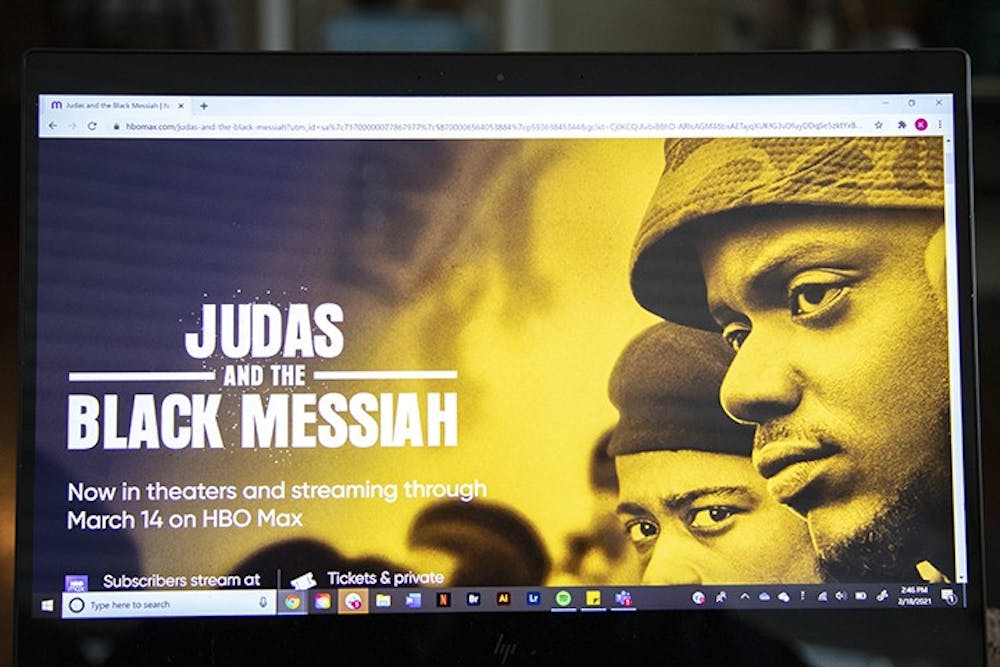Movie: “Judas and the Black Messiah”
Release date: Feb. 12, 2021
Director: Shaka King
Runtime: 2 hours 6 minutes
Genre: History, drama
Columnist's rating: A
The opening shot of "Judas and the Black Messiah" follows a man wearing a suit and trench coat walking down the street, checking out the block and entering a bar to impersonate a federal officer in order to steal a man’s car by demanding his keys.
This is all done in a few masterful long takes that feel pulled straight from the repertoire of a cinematic legend such as director Martin Scorsese. The reality is that this is only Shaka King’s second feature-length directorial effort, his first since 2013’s "Newlyweeds,'" with short films and television episodes in between.
The film is thoroughly interested in making political statements, as the opening documentary footage makes clear, but these carefully crafted opening moments signal King is making a statement that he has arrived as a premier filmmaking talent.
These opening moments are to establish the character of Bill O’Neal, a Black man arrested for impersonating a federal officer who agrees to infiltrate the Black Panther political party as an FBI informant in exchange for his freedom.
O’Neal, portrayed by LaKeith Stanfield, is the titular Judas to Fred Hampton’s "Black Messiah," played by "Get Out" star Daniel Kaluuya. Hampton, at only 21 years of age, was the chairman of the Illinois chapter of the Black Panther Party in late-'60s Chicago.
The film hinges on the central relationship of O’Neal and Hampton — one of betrayal, as the title not-so-subtly suggests — but Judas and the "Black Messiah" is such an immersive film that there is a load to appreciate.
The Chicago that these characters inhabit is incredibly realized: City streets feel full and alive, and the different organizations Hampton speaks to are responsive and brimming with protest and angst. Even the offices of the FBI are detailed with a '60s aesthetic shared by shows such as "Mad Men." The photography of the film is all-around excellent and one of the film's greatest strengths, thanks to cinematographer Sean Bobbitt.
Fans of films such as "The Departed," directed by the aforementioned Scorsese, will enjoy the incredible tension King draws out from the covert scenarios O’Neal plays out within the party. The film even features Martin Sheen playing a member of law enforcement talking about a rat.
While similar to "The Departed" in structure, it shares more thematic material with "The Assassination of Jesse James by the Coward Robert Ford," an American film about the consequences of betrayal in the old West.
Much like Casey Affleck’s character in that film begins to adore Brad Pitt’s Jesse James, O’Neal begins to connect with what Hampton is preaching about. His conflicted feelings, between ratting on the Panthers for his freedom and supporting the movement, is the most compelling and powerfully acted storyline.
Stanfield tows this emotional line so well as O’Neal that in the film, his FBI contact Roy Mitchell, played by Jesse Plemons, comments, “Either this guy deserves an academy award, or he really believes this s—,” when observing O’Neal chanting at one of Hampton’s rallies.
It’s unclear at the moment if O’Neal did believe in the cause or just for the people, but the first part of Mitchell’s statement definitely applies to Stanfield’s performance.
Stanfield as O’Neal isn’t the only award-worthy performance from this film, however. In his standout scene, Kaluuya as Hampton chants “I am a revolutionary” as he pumps his fist in front of a crowded church in his first speech after being released from prison. The sound design in particular makes his words come alive in a forceful way that makes the film’s message of liberation and social justice deeply moving.
"Judas and the Black Messiah" is entertaining and well-made, but if anything is going to live on from this film, it’s that revolutionary spirit Hampton embodies.
2020 saw Hampton’s influence and spirit return with the surge of support for the Black Lives Matter movement. With talented African American filmmakers such as Shaka King starting to get more funding for ambitious films such as "Judas and the Black Messiah," that sentiment will continue to grow.

